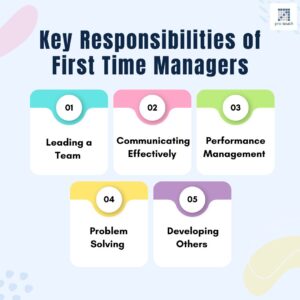💼 Who is a First-Time Manager?
A first-time manager is someone transitioning from an individual contributor role to a position where they now lead others — managing performance, guiding teams, and making decisions that affect people and projects. ICF certification, ICF coach training certifications can help in gaining more insight about the topic.
🔑 Key Responsibilities
- Leading a Team – Set goals, delegate tasks, and motivate team members.
- Communicating Effectively – Keep everyone aligned through clear, timely communication.
- Performance Management – Give feedback, conduct reviews, and manage outcomes.
- Problem Solving – Resolve conflicts and make decisions that support team success.
- Developing Others – Coach, mentor, and identify growth opportunities for team members.

first-time manager
🧠 Essential Skills for Success
- Emotional Intelligence (EQ) – Understand and manage your own emotions and those of others.
- Time Management – Balance your responsibilities and prioritize effectively.
- Adaptability – Learn to shift strategies and approaches based on team and business needs.
- Delegation – Let go of doing everything yourself and trust your team.
- Active Listening – Hear concerns and suggestions fully before responding.
🚀 Top Tips for First-Time Managers
- Build Trust First – Be transparent, consistent, and approachable.
- Set Clear Expectations – Align the team on goals, roles, and standards.
- Don’t Micromanage – Empower your team while staying available for support.
- Ask for Feedback – Learn how your leadership style is being received.
- Keep Learning – Read books, attend workshops, or get a coach/mentor.
Why Coaching Is the Ultimate Support System:
Coaching stands out as the ultimate support system in both personal and professional growth because it provides individuals with the structure, space, and strategies they need to thrive. Here’s why:
- Personalized Development: Coaching is tailored to an individual’s specific goals, challenges, and context. Unlike generic advice or training, coaching adapts to the person, making it far more effective in helping them move forward with clarity and confidence.
- Safe Space for Reflection: A coach provides a confidential, non-judgmental environment where individuals can openly explore their thoughts, fears, and goals. This safe space allows for honest reflection, which is often the first step toward meaningful change.
- Clarity and Focus: With regular coaching, people gain clarity on what truly matters. Coaches help individuals identify priorities, cut through distractions, and focus their energy on high-impact actions aligned with their purpose or vision.
- Accountability and Progress: Coaching creates a powerful system of accountability. Knowing someone is tracking their progress and expecting follow-through motivates individuals to stay on course and take consistent action toward their goals.
- Skill and Mindset Development: Coaches don’t just help people solve problems — they help them grow. Whether it’s leadership, communication, emotional intelligence, or resilience, coaching cultivates both hard and soft skills needed for long-term success.
- Unbiased Perspective: Unlike mentors, managers, or friends, coaches bring an objective, outsider’s perspective. This neutrality helps individuals see blind spots, challenge limiting beliefs, and make more informed decisions.
- Support Through Change: Change is hard — whether it’s a career transition, leadership role, or personal transformation. Coaching provides ongoing support, encouragement, and tools to navigate uncertainty and complexity with confidence.
- Empowerment Over Dependency: Rather than offering solutions, coaches empower individuals to find their own answers. This builds self-reliance, confidence, and the ability to face future challenges independently.
🎯 First-Time Managers: Why Coaching is the Ultimate Support System

Coaching
🧭 1. Navigating a New Identity
Transitioning from a peer to a leader is one of the toughest career shifts. Coaching helps first-time managers: Understand their new role. Build confidence as a leader. Manage the mental and emotional adjustment
Coaching = A mirror + a map — it reflects strengths and challenges, while guiding them toward effective leadership behaviors.
🛠️ 2. Building Core Leadership Skills
First-time managers need practical, personalized skill development. Coaching provides targeted support to build: Communication and feedback skills. Emotional intelligence. Conflict resolution. Time and priority management
Unlike one-size-fits-all training, coaching adapts to real-time challenges.
🤝 3. Safe Space for Real Talk
New managers often face internal doubts or team issues they can’t openly discuss with peers or bosses. Coaching offers a confidential space to: Express vulnerabilities without judgment. Reflect on mistakes and learn from them. Test ideas before implementing them
💡 4. Enhancing Decision-Making
With so many new responsibilities, first-time managers are under pressure to make the right calls. Coaching: Improves critical thinking. Encourages perspective-taking. Helps clarify values-based decision-making. It accelerates growth by turning experience into insight.
📈 5. Driving Long-Term Success
Investing in coaching early sets the foundation for a successful leadership journey. Coached managers are more likely to: Stay engaged and motivated. Lead more productive, collaborative teams. Grow into higher-level leadership roles faster
✅ Conclusion:
Coaching Isn’t a Luxury — It’s a Launchpad: For first-time managers, coaching is not just support. It’s an accelerant, a safety net, and a strategic investment in future leaders.
Coaching is not a one-time solution — it’s a continuous partnership that drives sustained growth. It combines insight, structure, challenge, and encouragement, making it the ultimate support system for anyone striving to lead, perform, or live at their highest potential.
Coaching Is the Ultimate Support for First-Time Managers: The transition to management can be overwhelming, but coaching provides the clarity, confidence, and capability new leaders need. It offers personalized guidance, a safe space for growth, and real-time support to develop leadership skills that last.
By investing in coaching, organizations empower first-time managers to lead with purpose, communicate with impact, and build high-performing teams from the start — making coaching not just a support system, but a strategic foundation for long-term leadership success. Courses like ICF certification, ICF coach training can enhance your skills and knowledge.





Leave a Reply